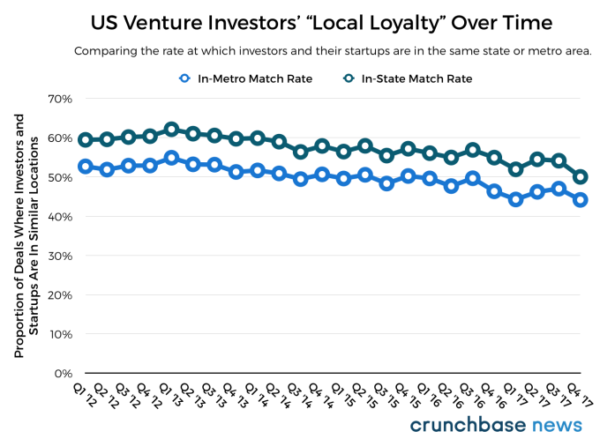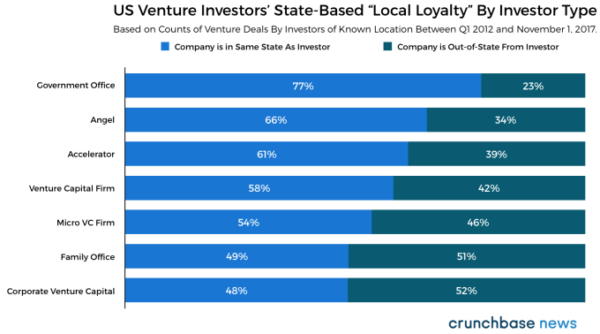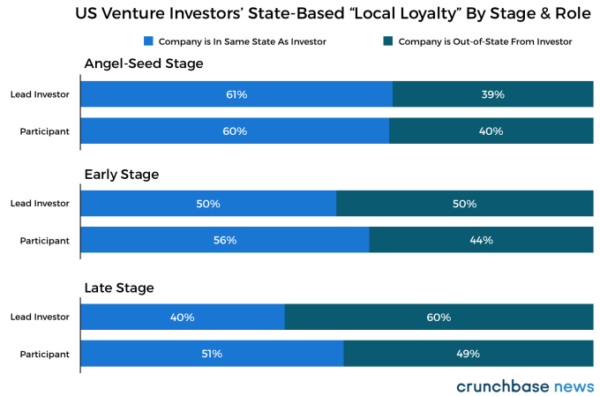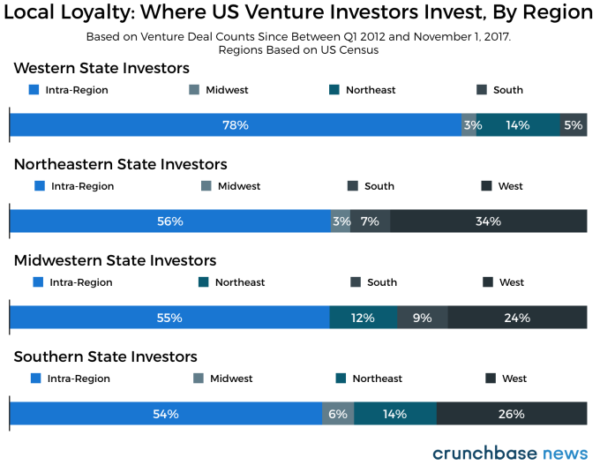Location, Location, Location
Here are some “truisms” about startup investors and location that I’ve experienced and passed on over the years:
- Startup investors prefer to invest locally
- The younger the startup business, the more that is true
- Your lead investor/board member is more likely to be a local investor than your passive/follower investors
- The location preference is more pronounced with investors who are located in vibrant startup markets
- The location preference fades as companies mature
Last week Techcrunch published some numbers on the issue of location and startup investing using Crunchbase data on 36,700 startup investment rounds they have tracked from Q1 2012 through October 2017.
So let’s see what the numbers say about these truisms.
Startup Investors Prefer To Invest Locally

This is true, over half of all investors in startups are in the same state. But it appears that the location preference is declining over time, maybe brought on by the significant improvements in videoconferencing and other communications technologies.
The Younger The Startup, The More There Is A Location Preference

This is true. 66% of angel investments come from in state investors whereas only 58% of VC investments come from in state investors.
Lead Investors Tend To Have A Stronger Location Preference Than Passive Investors

This does not appear to be true.
Location Preference Is More Pronounced In Vibrant Startup Markets

This is very true.
The Location Preference Fades As Companies Mature

This is very true.
At USV, about 25% of our investment activity is in NYC, 50% is rest of US, and 25% is outside of US. We are not completely location agnostic as we don’t invest very far away (South Asia, Asia, Middle East, Africa, etc) and we likely over-index on NYC vs the rest of the VC industry.
But the truth about being a startup investor, unless you are located in the bay area, is you have to go where the best opportunities are. That is particularly true if you are a thesis driven investor, as we are at USV.
So as much as I’d like to walk to my board meetings, that just isn’t reality. That said, I plan to walk to a board meeting on Tuesday.
Comments (Archived):
i would like to see the global numbers for ICOs. a new paradigm.
that would be interesting. i guess they are very spread everywhere.
yes, i expect so. i look forward to seeing future research that compares location proximity for traditional angel/ VC investments to location proximity for token investments as ROI. not sure that kind of data will be easily (or at all) available. that’s where blockchain is somewhat opaque. we see through explorers the addresses, but where the key holders are may never be known for sure.
William Mougayar:We didn’t view any comments by you on Ethereum having estimated 280 million disappear (frozen by a novice programmer that allowed anyone (programming ability) to claim it. The Ethereum community leaders are calling it a lockup but the word on the street is was a novice (OK) programmers change to the code that allowed it.http://fortune.com/2017/11/…
code change with intent, or a blunder?
i’m told it will get fixed.
It’s interesting how ICO’ed companies are mostly global from day 1, and there is almost no relationship between where they are, and who is “investing”. Actually, their challenge is to find talent in their geographies and how to manage global teams from day 1.
The dollar size of some funds makes them by default worldwide ones. They must be very difficult to manage and figure out where you can put that type of cash. It will be interesting to see their track record down the road.
Tom Labus:example to your point would be Softbank funds.
I wonder, how the data would look like for Europe.My guess:- Most VCs /Angels stay within their national borders (e.g. only Germany, only France, only Poland, only UK, only Israel)- Many of those invest most within their closets hubs (e.g. Paris, London, Berlin, Barcelona)- Some VCs are active in regions (e.g. Scandinavia, Eastern Europe, Middle East)I agree, that thesis driven VCs have more global deal flow and portfolio. There aren’t always enough great companies within one region to invest in.
control variables much?
I completely agree with Fred’s Thesis. I think investing in an ICO where you don’t know what is going on is crazy. What is the team working on? How are they spending your money?Good Luck. Yes the world is different this time…NOTHowever, does that mean you have to move to NY or SF to do a startup??? NOTI have been a huge believer that you can do startups and find money outside of those ecosystems and not have to spend like a drunken sailor on shore leave for talent.
does that mean you have to move to NY or SF to do a startup??? NOTVery simple and I will make my point again. Target rich environment is better. Sure any obstacle can be overcome for the truly talented, unique or already connected. But always remember we are talking about a system where luck plays a large role. And being near and close to others doing things where you can have a spontaneous meeting is a super big advantage. No way around that.
If you are in Fin Tech or Ad Tech yes. But spontaneous meetings are way over-rated. I don’t take them do you? And see my comment. If you need to burn serious money to get going yes.Otherwise money will come to you.
You can bridge the development gap somewhat I agree.But at some point you need to be where your market is if that is the nature of the business.Everyone, especially ICOs talk about everything about the market, how to get to it and the team and budget to make it so.That is why I think 95% is a good target for failures.Read 20 or more white papers and this jumps out at you. That and no freaking idea of whether behavior can be tokenized with the dynamics of the community.
1ST JOB OF STARTUP: MAXIMIZE CHANCE TO WIN.BE NEAR VCS, MARKET, AND TALENT GOOD WAY TO DO THAT.BE FAR AWAY FROM VCS, MARKET, AND TALENT… NOT.
Me say very much depends.If you need bagfuls of money to burn to keep you warm….yes.Talent? Me say you can find and grow talent many places (especially near Universities) beauty of not NY or SF you can keep it and pay it much less and lives much better. Heat is much less, so you don’t have to burn as many bags of money, much less turnover which also costs bags of money.Market? Me say we have this technology called trains, planes, an automobiles. Unless you are selling to purely the city you are located in, you need to get on one of those.
Another option..BE AWESOME AND VCS BE NEAR YOU.
You have to be less than an hour from a major airport. That I will say.But going across the country I would say you have the metro areas of Phoenix, Houston, Austin, Dallas, Atlanta, Tampa, Miami, Orlando, Charlotte, Richmond, DC, Philadelphia, NJ, Pittsburgh, Columbus, Bloomington, Chicago, Minneapolis, Kansas City, Portland.This doesn’t include LA, Seattle, Denver which are considered “second tier”I’m sure I slighted somebody there, but my point is don’t fall into that trap that you have to be in NY or SF. Sure it’s great and if that’s your thing go for it.
Is 2nd tier the label for the airport or opportunity by market?
Opportunity. Have to be near a major airport. The one’s I listed are not even on a “tier” that is only US.
FAKE NEWS
This might have been true 5 years back, not today.
There you go again: Insulting drunken sailors!
I would disagree with you a little bit here. Just because one knows what the team is working on and have close proximity does not mean that the outcome is going to be great. The role of the investor/board is also overrated more times than not. So proximity, relationships, visibility,. etc. may not count for as much as we think.What matters more is the underlying market dynamics, the culture and commitment of the team, and if they are smart enough to deal with the truth of their business and iterate to the opportunity fast. “Market”> “Team and Culture”> “Product”.Most ICOs might fail, but a few ICOs do have the potential to be really disruptive. In 2014, would traditional investors have funded a 19 year old kid from Toronto building something called Ethereum? Despite the opaqueness, crypto-coins and tokens are liquid and that matters a great deal. Also, the outcomes are power-law like, not dissimilar to traditional VC.The crypto and block chain world is incredibly global and diverse and that gives me hope, notwithstanding the scam artists.
This data replicates sensibility. Suppose you are an angel investor. How are you going to invest in the Bay Area if you aren’t physically there? It’s tough to meet and find deals. But more importantly, it’s tougher to utilize your network to help someone. I have heard that in Silicon Valley, it’s hard to get someone to drive 60 minutes to a board meeting let alone get on a plane and go somewhere at an early Seed or Series A stage.When we started HPA we used the rule of thumb, “one day drive” to limit our geography. (Limits are good for creativity and focus) In our current fund, we are doing it by focus on industry and cities. I was in NYC the other day because it fits our thesis. Toronto would be a good city for us but LA probably would not be.
This is another example of how young people have an advantage over older people. Family situation and obligations limit generally where older people can go for practical reasons. If I was younger I (knowing what I know now) certainly wouldn’t be where I am living.This is why I pushed my daughters to go live in NYC after college and not live in the Philly metro area.
You know, for someone like yourself, it doesn’t need to be so restrictive.I’ve made a conscientious effort to work 1/4 on the West Coast to brush off and rebuild my networks. Solid in LA, getting there in SF proper.Your kids are gone, you could do something similar if you wanted.
Geosynchronous.
In life in so many ways it’s all about being in a target rich environment where there is opportunity and even more important serendipity.The target rich environments are SV, SF, NYC, Boston and LA. Sure it’s possible and good things happen elsewhere. But why would you want to not have every advantage that you could have?
CONTRIBUTORS:”Here are some “truisms” about startup” – FredThis question is for any contributor who has been a seasoned Board of Director(s).Why does it appear to be a good old Boys club? (Rhetorical)We as Day Traders see some obvious fixes to companies that take years for the company to implement. Examples.Review our post around two years ago being critical of Twitter not expanding the amount of characters. When Twitter implemented the character increase after years it appears the company is genius. Any company being late to act on advancing will become a dinosaur in technology. (We can’t take credit nor are we for the suggestion because it had been suggested before on increasing the characters)In many public companies it appears the BOD are rubber stamps for the CEO or founders. (We realize this isn’t the case in all companies, that would be naive)Why does it take years for BOD to act on obvious issues and fixes in a company or appear to act on issues only after it is a crisis or critical to the survival of a company?The BOD in UBER & WIENSTEIN companies knew or were aware of issues years before the public and then act like they just were notified with the public. BOD are receiving an average of 400K per boardship. How many boards can a person serve diligently?The best companies are saying three max. But what BOD receiving millions per board appointment will ever self resign on receiving millions per company for five or more boards? NoneCaptain Obvious!
Yup, again, once again, over again, yet again, one more time, when have enough data, essentially the universal, uniform, unique, all-time best statistical and data analysis is just cross tabulation yielding marginals, when have enough data. Did I mention when have enough data? And if want some deep reasons, then we can drag out the Radon-Nikodym theorem — but, without that result, trust me on this one. So, essentially all the rest, e.g., multivariate statistical analysis, is mostly for where don’t have enough data. AI/ML/data science people, shut up, sit down, listen up, and learn something.Point by point, picture by picture, saying just what the intended conclusions are — rare but super good stuff.But given two such analyses, might do a statistical test of significance, e.g., a two sample test, and there is a cute, distribution-free (non-parametric), resampling way to do that. For these analyses, the results were so clear such tests are not worth it.And we have now completed the important points of the first half of Statistics 101, and everyone got an A. No midterm exam needed. Note: We never mentioned any probability distributions!Good, simple course.Enjoy your midterm break; for your English exam try to remember the name of Gawain’s horse; and find someone you like to share a pizza.
Thesis and industry generate co-location.NYC is a financie / media town – not a lot of enterprise SW.Boston is ……Valley is everything, etc.CGY & Houston are vibrant energy startup towns.Pittsburgh was likely a steel startup town at one point.